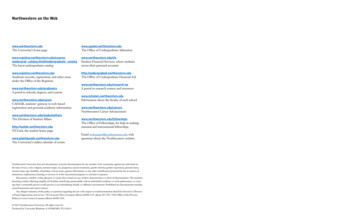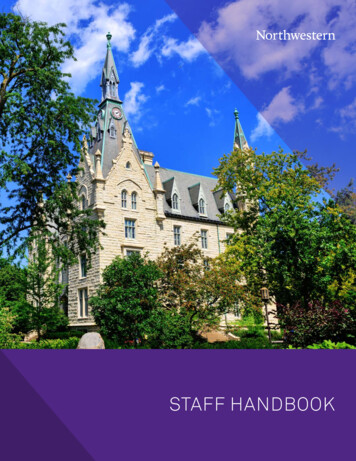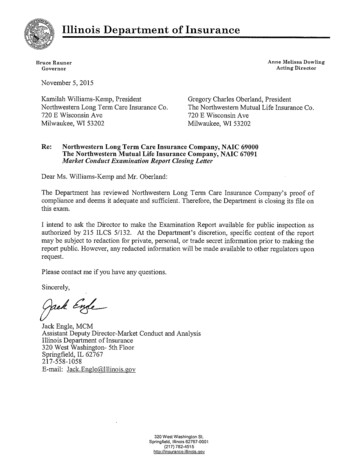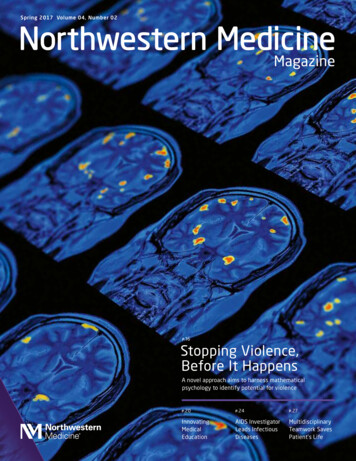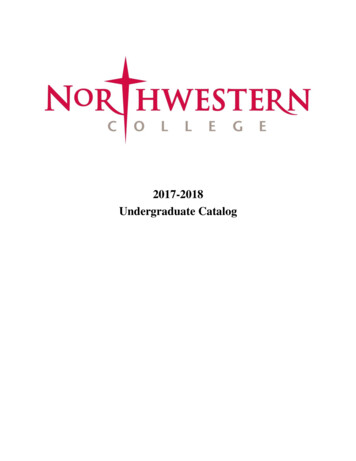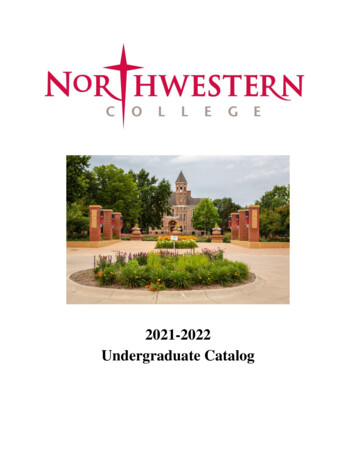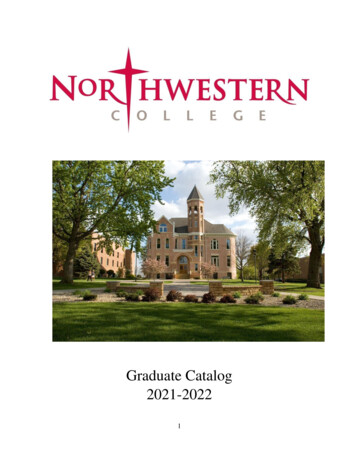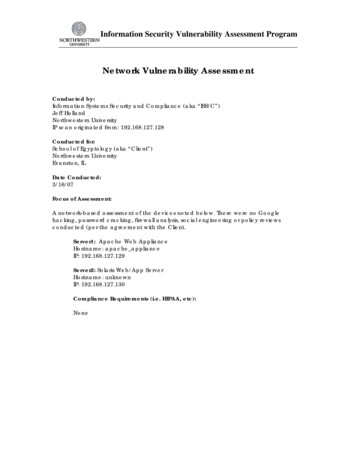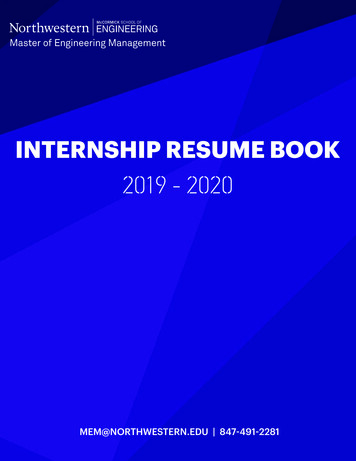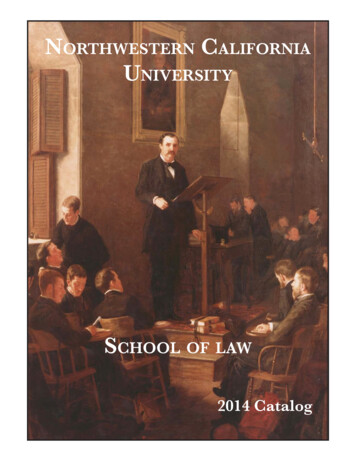
Transcription
Northwestern CaliforniaUniversitySchool of law2014 Catalog
NWCU SCHOOL OF LAWMessage from the Dean“One thing more expensive than education is the lack of it.”Michael Patrick Clancey Dean of Northwestern California UniversityNorthwestern California University is a non-traditional law school. It arosefrom the needs of those who desired to study law but because of financiallimitations, family responsibilities, geographic location, time constraints, etc.,could not attend a regular classroom type law school.History is filled with the names of famous American lawyers and jurists who,for one reason or another, came to the Bar after having been essentiallyself-taught in law. Persons like Abraham Lincoln, Thomas Jefferson, U.S.Supreme Court Chief Justice John Marshall, Daniel Webster, Henry Clay,(Harvard) Dean Roscoe Pound, Robert Jackson (U.S. Supreme Court Justiceand Chief U.S. Prosecutor at Nuremberg ), Clarence Darrow, and many more, either spent little time in lawschool or, in the example of Lincoln, never even saw the inside of a law school. They had in common a burning desire to learn law and mentors to guide them in their quest.I strongly encourage those of you who can attend a regular classroom type law school to do so. I realize,however, that this is not possible for many. The strongly motivated, who are unable to attend class, can stillobtain an excellent education in law through enrollment in our program.The information you will find in the pages that follow will give you a sense of all our School of Law has tooffer its students. Through a combination of online coursework, webcast audio/video recorded lectures, andtextbook study, the school provides opportunities ranging from a two-year Bachelor degree program to afour-year Juris Doctor degree program.We at Northwestern California University commend you in your pursuit of higher knowledge. Abraham Lincoln once wrote to a young student interested in studying law, telling him:“Get the books, and read and study them till you understand them in their principal features;and that is the main thing. Your own resolution to succeed is more important than any onething.”Our school’s innovative; quality programs will help you succeed. They are exceptional not because the Schoolhas been in existence for over 30 years; but instead, the School has been in existence for that period of timebecause the programs are exceptional.I now invite you to discover in your reading of the other pages of this Website some of the many aspects ofwhat makes the online law study community of Northwestern California University an extraordinary place tolearn.Very Truly Yours,Michael P. ClanceyPage 2
Letter from the Academic DeanDear Prospective Applicant:Thank you for your inquiry into the educationalprograms offered by Northwestern California University School of Law.This Catalog provides information regarding theobjectives and requirements of the school. It alsodescribes in detail the courses and degrees offered.Academic Dean Mary SchofieldWe are proud of the uniqueness of our school inthat it offers a tailored course of study utilizing Internet and recorded teaching to provide a thoroughlegal education for applicants seeking CaliforniaState Bar Eligibility. It is equally suitable for students with other career goals in mind.Table of ContentsWe are eager to assist you in your educationalneeds. After reading the information we hope youwill be as excited about our programs as we are.Transcripts from schools you previously attendeddo not have to be received by our school before youcan be approved for enrollment. Verification of thatinformation may be supplied after your studieshave begun.Your interest in our school is most appreciated.We look forward to receiving your application forenrollment.Sincerely,Catalog January 1, 2014—December 31, 2014MESSAGE FROM THE DEAN2LETTER FROM THE ACADEMIC DEAN3HISTORY OF THE SCHOOL4CURRICULUM & DEGREE REQUIRMENTS5BACHELOR of SCIENCE in LAW (BSL)5JURIS DOCTOR (JD)COURSE DESCRIPTIONS57BAR MEMBERSHIP & REGISTRATION9GENERAL INFORMATION & SCHOOL POLICY10ADMISSIONS REQUIREMENTS14Mary SchofieldPRE-LEGAL EDUCATION15Academic DeanFACULTY & STAFF MEMBERS16TUITION & EXPENSES17FREQUENTLY ASKED QUESTIONS18ALUMNI FEEDBACK23CONTACT INFORMATION23 Copyright 2014Northwestern California University School of Law Allrights reserved. No part of this catalog and/or materials may be reproduced in any form or by any meanswithout written permission.Page 3
History of the SchoolNorthwestern California University School of Lawwas founded in 1982. It is the oldest law school of itstype with continual operation in California, havingbeen approved in 1982 to issue degrees by the Stateof California Department of Education. Its JurisDoctor (J.D.) degree program is presently registeredwith and regulated by the California State Bar.The school is located in a modern office buildingwith a beautiful riverside setting next to the Sacramento River in Sacramento, California. The school’sfacility contains an administrative lobby, facultyoffices, a mock courtroom and a law library.The school’s mock courtroom is used for periodicreview sessions for local students. The resident sessions are not a required portion of the school’s online program, since the defining feature of the schoolhas been that students are not required to attendclasses or study sessions in person.Graduates of the school’s Juris Doctor law studyprogram include many who have gone on to occupyinfluential positions in government. They have beenemployed in positions such as Deputy District Attorney and Juvenile Gang Prosecutor in California,as General Attorney at the U.S. Equal EmploymentOpportunity Commission, Office of Federal Operations in Washington D.C., as Court Executive for aU.S. District Court, and as (Presidential appointee)Director of the Office of Thrift Supervision, U.S.Department of Treasury in Washington D.C. Manyothers, after graduation, have been promoted tohigh-level positions in business and industry, andstill others have entered the private practice of lawfulfilling lifelong ambitions.Videoconferencing. Students have access to anelectronic law library, through LexisNexis, and cannetwork with the professors and each other, andparticipate in online “real-time” chats, through theschool’s Internet campus.Students, both past and present, include graduatesof leading colleges and universities throughout theworld including Oxford, Harvard, Yale, Stanford,MIT, Beijing University, the University of Paris, KeioUniversity of Japan, the University of Michigan, theU.S. Naval Academy, the U.S. Air Force Academy,and many others.Numerous students and graduates of the schoolwithout prior college degrees qualified for enrollment based on their having acquired sufficientcourse credits (60 semester college units) or adequate scores on a few selected and specific CollegeLevel Equivalency Program (CLEP) tests.Northwestern California University has from its inception focused on providing a law study program ofthe highest quality at a very affordable rate of tuitionto people who live far from traditional schools, orwith family commitments, or jobs that involve irregular hours, or travel.No Law School Admission Test (LSAT) scores arerequired for entry to the school. A ‘Rolling Enrollment’ process allows immediate commencement oflaw study.The school’s online programs are offered over theInternet through a course management system andtechnology platform featuring Online DiscussionBoards, Audio/Video Lectures and a Virtual Classroom to provide dynamic collaboration and communication between students and faculty members.The faculty consists of law professors who are available to all students for course-specific questions viathe school’s Online Discussion Boards and throughPage 4
Curriculum & Degree RequirementsDegree Program: Law Study Title Of Degree:Bachelor Of Science In Lawcases that they read and brief, and examinationsgiven in traditional format.The Bachelor of Science in Law (B.S.L.) degree may beearned while pursuing the prescribed curriculum forthe degree of Juris Doctor (J.D.).The students are encouraged to supplement theprescribed instruction with other study materialstraditionally used by law students and usually purchased ‘off campus’. These supplemental materialsinclude hornbooks, flow charts, flash cards, etc.The B.S.L. is an undergraduate, non-professionaldegree available to those who complete one-half of theschool’s law study (J.D.) program after having firstcompleted 60 or more acceptable college semesterunits or 90 quarter units, or the equivalent, with a cumulative GPA of at least 2.00 at an accredited or stateapproved school, to be eligible for admission.Requirements:The Bachelor of Science in Law Degree will be grantedto those students who successfully complete Part Iand Part II of the law study program, which consistsof a total of eight courses. Each course is worth 6units of credit for what is the equivalent of two semesters, or one academic year’s worth of schoolwork.It is required that a minimum of 216 study hours beexpended by each student per course. Accordingly, 36study hours are expended at a minimum for each unitof credit.Northwestern California University does not requireformal, on-campus residence or classroom attendance.Four years of law study are required by the CaliforniaState Bar for those seeking such eligibility through theLaw Study Program.A minimum overall gradepoint average of 2.00 isrequired in Part I and II of the law study programbefore the Bachelor of Science in Law Degree will beawarded.Prerequisites/Admission Requirements:Students must have completed 60 or more acceptablecollege semester units or must have passed CollegeEquivalency Examinations approved by the CaliforniaCommittee of Bar Examiners.Instructional Methods:Students listen to recorded lectures. Additionally,written material is studied for each course. The writtenmaterial is comprised of online school guidebooks,commercially prepared course outlines and, for mostcourses, casebooks.Students are exposed to most of what they would havebeen exposed to by attending classes at a traditionallaw school, i.e. lectures given by law school professors,Page 5Students in this school’s law study program,just like students at traditional law schools, arerequired to listen to the course lectures, preparecase briefs, read prescribed written materials andtake mid-term and final examinations. Additionally, for our first-year students, an open book quizmust be completed prior to the taking of midtermsin each of the following first-year courses: Contracts, Torts and Criminal Law.Mid-term examinations are done by the studentsin open book fashion and must be sent to theschool by the students for grading by one of theschool’s faculty members. A mid-term grade constitutes one-third of the student’s ultimate gradefor a course.Final examinations are administered by a selectedproctor who must be a lawyer, a judge of a regional court or a school official (school administratoror teacher). The school sends the final examination to the proctor who administers the exam tothe student and returns the answers to the schoolfor grading. The final exam grade constitutes theremaining two-thirds of the student’s final grade.The test questions for the midtermsand finals are styled after those givento law students at most traditional lawschools and are similar in complexity.Curriculum:See the list of courses for the Law Study Programin the Course Description section. Those listedunder Part I and Part II of that program are thecourses that must be successfully completedbefore the Bachelor of Science Degree will be conferred. Some limited course substitution, i.e., substituting a course from Part III or IV for a coursein Part II, may be allowed or advised dependentupon a particular need or interest of the student.Additional elective courses are offered as a supplement to the prescribed curriculum.Degree Program: Law Study Title Of Degree: Juris DoctorThe Juris Doctor (J.D.) degree is a graduate, professional doctorate degree that is conferred upon
DisclosureCurriculum & Degree Requirementsthose who complete the school’s law study (J.D.)program.Requirements:The Juris Doctor Degree will be granted to individuals who have successfully completed all requiredparts of the law study program. It is the student’sresponsibility to be sure that Bar eligibility requirements are followed.Each course in Part I through Part IV of the lawstudy program is worth 6 units of credit for what isthe equivalent of two semesters, or one academicyear’s worth of school work. It is required that aminimum of 216 study hours be expended by eachstudent per course. Accordingly, 36 study hours areexpended at a minimum for each unit of credit.Prerequisites/Admission Requirements:Same as those previously disclosed for the Bachelorof Science in Law Degree.Instructional Methods:Same as those previously described forthe Bachelor of Science in Law Degree.Curriculum:See the list of courses for the Law Study Program inthe Course Description section of the catalog.Disclosure[Important Disclosure Required of All Correspondence/Distance-Education Law Schools in California]The Bar Program - Juris Doctor Degree:The method of instruction at this law school for theJuris Doctor (J.D.) degree program is principally bycorrespondence.Students enrolled in the J.D. degree program at thisschool who successfully complete the first year of lawstudy must pass the First-Year Law Students’ Examination required by Business and Professions CodeSection 6060 (h) and Rule 4.55 of Title 4, Division 1of the Rules of the State Bar of California (Admission Rules) as part of the requirements to qualify totake the California Bar Examination. A student whopasses the First-Year Law Students’ Examinationwithin three (3) administrations of the examinationafter first becoming eligible to take it will receivecredit for all legal studies completed to the timethe examination is passed. A student who does notpass the examination within three (3) administrations of the examination after first becoming eligibleto take it must be promptly disqualified from thelaw school’s J.D. degree program. If the dismissedstudent subsequently passes the examination,the student is eligible for reenrollment in this lawschool’s J.D. program, but will receive credit for onlyone year of legal study.Study at, or graduation from, this law school maynot qualify a student to take the bar examination orto satisfy the requirements for admission to practicein jurisdictions other than California. A studentintending to seek admission to practice law in jurisdictions other than California should contact theadmitting authority in that jurisdiction for information regarding the legal education requirements inthat jurisdiction for admission to the practice of law.Significant Note: Students disqualified fromcontinuance in the school’s law study program fornot having passed the California First-Year LawStudents’ Examination within three (3) administrations of the examination after first becoming eligibleto take it are, nonetheless, eligible for conferment ofthe Northwestern California University Bachelor of Science in Law (B.S.L.) degree uponsuccessful completion of two years of study with acumulative grade point average of 2.0. As to students who are already bachelor degree holders, theyare eligible to earn the school’s B.S.L. as a secondbachelor’s degree. Completion of the degree signifiescritical awareness of the common law legal traditionof the United States and the ability, as a non-lawyer,to apply analytical and problem-solving skills in avariety of legal and non-legal settings.Notice to Prospective Bachelor of Science inLaw Program Students: As a prospective student, you are encouraged to review this catalog priorto signing an enrollment agreement. You are alsoencouraged to review the School Performance FactSheet, which must be provided to you prior to signing an enrollment agreement.Page 6
Course DescriptionsBachelor of Science in Law (B.S.L.) and JurisDoctor (J.D.)PART I Introduction to Law and Legal Writing-- Introduction to the basic concepts of law andlegal writing, and the history of the Americansystem of jurisprudence and juristic theory thatoriginated from, and was developed and formulated through, the common law of England,and is now recognized as an organic part of thejurisprudence of most of the United States. Criminal Law -- A study of that branch or division of the law that relates to crimes and theirpunishments. Contracts -- A study of the promissory agreements that exist between two or more personsor entities and that create, modify, or terminatelegal relationships. The different classificationsof such agreements and the requisite elementsof each will be distinguished. Torts -- An analysis of the private or civilwrongs or injuries which occur because of theviolation of duties imposed by law and not bymere agreements between parties. The courseanalyzes cases involving injuries to persons or toreputation or feelings, as well as to injuries anddamage to real and personal property. Specifictopics such as negligence, defamation of character, invasion of privacy, misrepresentation, andassault and battery will be discussed. PART III (Completion of Parts III and IV not required of those who wish to receive the Bachelor ofScience in Law degree only.) Corporations -- An analysis of the proceduresinvolved in forming a corporation, as well asthe rights and duties of directors, shareholdersand corporate officers. Comparative attention isgiven to court-made legal principles as well as tothe rapidly expanding impact of federal regulation of corporations and securities. Constitutional Law -- Topics include separation of governmental branch powers, includingthe Case and Controversy Doctrine and powersof the President; division of powers betweenthe federal government and the states; constitutional limitations on governmental regulationsof economic interests and fundamental personalinterests under the equal protection and dueprocess clauses; due process and procedure; thestate action concepts; and freedom of speech andreligion. Evidence -- A study of those rules of law thatdetermine what testimony and documentaryproof should be admitted or rejected in eachcase, and the weight to be given to the testimonyand exhibits admitted. Civil Procedure -- A course that studies themethods of enforcing rights and remedies in acivil lawsuit, including pleading, process, andpractice whether in the state or federal court.The course analyzes the regular and orderlyprogress of a civil action from its commencementto the entry of judgment.PART II Real Property -- A study of the body of lawrelating to land and improvements thereon; asdistinguished from movable personal property.The English Common Law as it relates to realproperty will be emphasized.Remedies -- A study of the common law remedies afforded to private persons or entities inthe civil courts insofar as their rights have beeninjured by the civil wrongdoing of another; asdistinguished from the remedy of criminal prosecution for injury to the rights of the public.Criminal Procedure -- A course analyzingthe methods prescribed by law for the apprehension, trial or prosecution and fixing thepunishment, of those persons who have brokenor violated, or are supposed to have broken orviolated the criminal laws.Agency and Partnership -- A study of thelegal aspects of the rights and liabilities ofindividuals involved in or dealing with agencyrelationships and partnerships. The course analyzes the creation of an agency, the master andservant relationship, the authority of an agent,dissolution and termination of a partnership andrelated agency and partnership concepts.PART IV Page 7Professional Responsibility (Ethics) (6units) -- A study of the ethical duties and professional responsibilities that apply to membersof the legal profession in California and underthe American Bar Association Code of Professional Responsibility and the Code of JudicialConduct.
Course Descriptions Community Property (6 units) -- A surveyof the law that relates to property owned together by husband and wife. Particular emphasis willbe given to the California community propertysystem and recent California developments incommunity property law. Administrative Law (6 units) -- A study ofthe rules and regulations related to commissionsand boards created by legislative power. Thegovernmental powers, legislative policies andpurposes that serve as the basis for administrative law will be examined along with the administrative remedies available. Wills (6 units) -- A survey of the fundamentalrules and concepts governing estate planningand administration. Course coverage includes:intestate succession, family protection and thelimits on the power of testation, execution,revocation and revival of wills, introduction tointerpretation of wills, contracts to make wills,will substitutes, creation and modification. Trusts (6 units) -- A study of the law relatedto the creation, modification and termination of intervivos and testamentary privatetrusts, the nature of the beneficiaries’ interestsin private trusts, introduction to charitabletrusts, introduction to the administration oftrusts and, an analysis of the powers, duties,rights and liabilities of fiduciaries, management of assets, and fiduciary accounting.ELECTIVES (Elective courses are for thirdand fourth year students, and: for transferstudents who have to take more courses to meetindividual requirements placed upon them bythe Committee of Bar Examiners, and havealready completed all, or almost all, of the standard curriculum of Northwestern CaliforniaUniversity.) Legal Research (6 units) -- A course that focuses on techniques used in finding appropriatebooks and other materials in the law library andthrough online research to draft legal pleadingssuch as complaints, demurrers, memorandums,supporting and opposing motions, points andauthorities, and other documents (i.e., articles ofincorporation, wills, trusts, petitions for dissolution of marriage or bankruptcy, etc.).Legal Writing (6 units) -- A course designedto develop logical and creative legal thinking andwriting for both examination and legal practicepurposes.Page 8 Legal Practice (6 units) -- Practical training that allows students to create a meaningfulpurpose for themselves in the field of law, tochoose an area of specialty, and to determinethe kind of practice in which they would bemost interested or best suited. Requires workin a law office under the internship of a lawyer,found by the student, who is willing to certifythe scope, depth and length of the work experience. Also requires that the student prepare apaper discussing the ethical, social, practicaland moral issues involved in such a practice.(Certain additional written work can, with priorwritten approval, be substituted for the workexperience/internship requirement.) Professional Skills (6 units) -- A course inwhich students develop a fictitious lawsuit andthen draft pleadings, discovery, and motionson behalf of the parties in the case. The skillsfocused on include organization, legal analysis,legal writing, legal ethics and tactics. Legal Document Drafting (6 units) -- Acourse that exposes students to basic legaldocument drafting in various settings. Draftingtechniques common to most legal documentswill be explored from the perspective of a smalllaw office setting. Students will represent a fictitious client and assist that client in a variety ofmatters including contract drafting, will preparation, negotiation and settlement of a dispute,and legislative drafting on a topic involving theclient’s interests. Trial and Appellate Advocacy (6 units) -A practical course designed around a fictitiouscase to provide students with an understandingof the rules of evidence and their applicationin a trial and appellate setting. The course hasan instructional component which draws uponassigned readings to contextualize various exercises. The focus of the exercises is on planning,case theory, trial strategy and tactics, openingstatements, direct and cross examination ofwitnesses, closing arguments, appellate briefwriting and appellate oral arguments. Medical Jurisprudence (6 units) -- A studyof the science which applies the principles andpractice of the different branches of medicine tothe identification and determination of doubtfulquestions in a court of justice. Course coverageinvolves a mixed science of law and medicine,sometimes referred to collectively as “forensicmedicine”.
Course Descriptions International Law (6 units) -- A study ofthe law which directs the course of nations. Thecourse provides an analysis of the customary lawwhich regulates the exchange and communications between independent nations in peace andwar. Military Law (6 units) -- A survey of theregulations for the governing of armed forces,particularly that branch of the law which respects military discipline and the government ofpersons employed in the military service of theUnited States. Philosophy of Law (6 units) -- Astudy involved with the application of the rational techniques of the discipline of philosophyto the subject matter of law. Course coverageincludes: the nature of law; moral theory and itsapplication to law; crime and punishment; and,law and economics. Philosophy of Law (6 units) -- A studyinvolved with the application of the rationaltechniques of the discipline of philosophy to thesubject matter of law. Course coverage includes:the nature of law; moral theory and its application to law; crime and punishment; and, law andeconomics.NOTE: Enrollment for all degree seeking studentsmust be in the School’s Juris Doctor Program. Thosewho enroll in the School’s Juris Doctor (JD) DegreeProgram may enroll in the school’s Joint Bachelor ofScience in Law (BSL) Degree/Juris Doctor (JD) DegreeProgram following the end of their first successfulacademic year of study in the Juris Doctor Degree Program. The BSL degree is awarded to those who choosethat option and successfully complete the second academic year of study.Bar Membership & RegistrationThe Juris Doctor (J.D.) law study program whencompleted over a four-year period is designed tomeet the requirements for licensure and admissionto practice in the California State Courts and theUnited States Federal Courts as a California attorney.The requirements for immediate and/or eventuallicensure and admission to practice in the courtsof other states may not be met by graduation fromNorthwestern California University. Many stateswithin the United States, however, upon applicationand testing will admit an attorney to practice afterhe or she has passed the bar of another jurisdiction(i.e. California) and has practiced law for a period oftime, usually five years.Admission to the practice of law in the State ofCalifornia is regulated by Section 6060 of the Business and Professions Code of the State of Californiaand by the rules of the Committee of Bar Examiners. Each student is responsible to comply with therequirements established by the Committee of BarExaminers. Those students seeking Bar eligibilityare advised to obtain and read Rule 4.55 of Title 4,Division 1 of the Rules of the State Bar of California(Admission Rules) which are available by writing orphoning the Committee at:The Committee of Bar Examiners 180 Howard StreetSan Francisco, CA 94105 (415) 538-2300Every student seeking admission to practice law inCalifornia is required to register with the Committeeof Bar Examiners. Students who enroll in Northwestern California University and should register withthe Committee of Bar Examiners within 90 days ofenrollment. The student registration numbers assigned by the Committee to new students must befurnished to the University by each student within60 days of his or her receipt thereof.Students, after one year of study, must take andsuccessfully pass the State of California’s “FirstYear Law Students’ Examination.” The requirementto take and successfully pass the “First Year LawStudents’ Examination” does not apply to transferstudents who have completed the first year at anAmerican Bar Association approved, or CaliforniaState Bar accredited law school such that they wereeligible for advancement into second year curriculumthere.It is important to note that individuals who do nothave a U.S. Social Security Number will not be allowed by the California Committee of Bar Examinersto register as a law student, or take the California“First Year Law Students’ Examination” or the California “General Bar Examination.” The requirementscan be viewed on The State Bar of California Websiteat http://www.calbar.ca.gov.Page 9
General Information & School PoliciesMissionNorthwestern California University was establishedin 1982 to provide quality education to individualsaround the world through independent, non-resident study.The school’s programs are designed to combine thebest features of traditional education with Internetbased, online and recorded instruction.A California Bar regulated program will prepareindividuals for admission to practice before the California State Courts, the United States Federal Courtsand the United States Supreme Court. The Bachelorof Science in Law degree will be awarded to thosewho complete one-half of the program. The degreeof Juris Doctor will be awarded to individuals whocomplete the entire program.The program requires four years of correspondencestudy in accordance with California Bar requirements.proved by the State of California to award degrees.The University has filed satisfactory affidavits andstatements of full disclosure with the State in each ofthe following areas: The Objectives of the University The Proposed Methods of Achieving those Objective The Curriculum Instruction Faculty Qualifications Physical Facilities Administrative P
History of the School Northwestern California University School of Law was founded in 1982. It is the oldest law school of its type with continual operation in California, having been approved in 1982 to issue degrees by the State of California Department of Education. Its Juris Doctor (J.D.) degree program is presently registered
